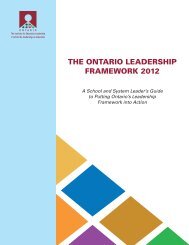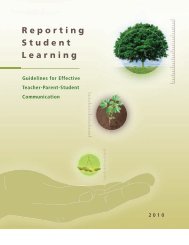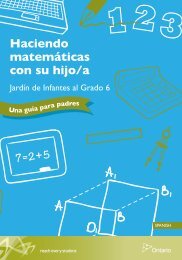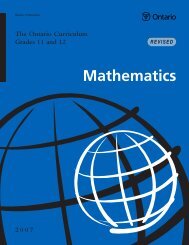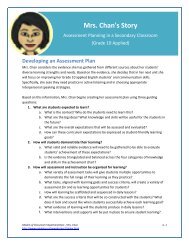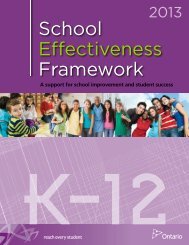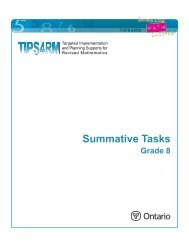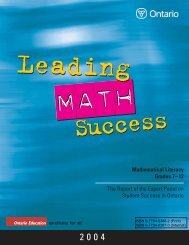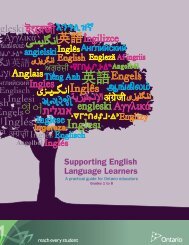• assisting with team and individual program planning related to effective mathematicsinstruction. The lead math teacher’s timetable may include a regular blockof time to meet with colleagues for program planning;• working with staff to identify, select, and organize mathematic resources for theschool. Although the lead teacher in each division may facilitate this process, allteachers within the division should be involved in deciding what resources topurchase, keeping in mind current research and board and ministry directives.The lead teacher may also work with others to organize, store, and develop a signoutprocedure for shared resources such as manipulatives and teacher resourcebooks, and to monitor the use of those resources. Some schools keep mathematicsresources in specific storage areas; others keep them in bins in the classroom usedby the lead math teacher;• working with the principal and colleagues to schedule uninterrupted blocks ofclassroom time for mathematics instruction and related activities;• helping colleagues plan the activities for the blocks of time dedicated to math;• demonstrating for classroom teachers how to use instructional time effectively.The lead teacher may also demonstrate how a classroom teacher can monitor timeon task and suggest ways to capitalize on every opportunity to review mathematicsskills – for example, as the class lines up to exit the room or when a student wondersaloud how much time is left until recess;• supporting the administration in planning the use of release time for staff duringthe school day that is to be dedicated to improving mathematics instruction;• connecting with the parents of students through presentations at school councilmeetings, regular math newsletters, and Kindergarten orientation sessions andother information meetings;• providing parents with strategies for home review and practice of mathematics skills,and encouraging and training parents to be effective school volunteers;• encouraging and supporting other teachers in reviewing student work, interpretingassessment results, analysing students’ strengths and needs, setting goals, andfocusing appropriate instructional strategies on the areas of student needs;• assisting teachers with the development and administration of assessment tools,the interpretation of assessment results for their individual classes, and subsequentprogram planning;• meeting with an individual teacher to discuss results of assessments for thatteacher’s class and to help plan future programming and strategies;• engaging in reflective discussions with other teachers about current instructionalpractice, with a view to improving it.The role of the lead teacher may vary from board to board and school to school.Each board, working with its school administrators, needs to determine if and how12 A Guide to Effective Instruction in Mathematics, Kindergarten to Grade 6 – Volume One
it wants to handle the assignment of lead teachers, and of any board-level personneldesignated to support math initiatives, in its schools.Experience in other jurisdictions indicates that lead teachers’ difficulties in settlinginto their new role and any misgivings on the part of school staff about the initiativeare minimized when the lead teachers are selected carefully, when they havecredibility with and the trust of their colleagues, and when they receive the supportof administration at both the school and the board levels. The likelihood of success isfurther enhanced when the lead math teacher’s role is developed in consultation withadministrators and staff and when expectations are realistic in relation to availabletime and resources.Lead teachers themselves can contribute to the success of math initiatives by recognizingthat change may be difficult, by encouraging colleagues to take regular but manageablesteps in implementing new strategies in their mathematics instruction, by beingsupportive of colleagues as they attempt new practices, and by celebrating effectivepractices and student successes with them.PRINCIPALS“As instructional leader of your school, you must support the efforts of all teachersto promote students’ mathematical skills. You can help by providing resources andtime for teachers to build their skills, discuss what works, and collaborate in aschool-wide effort to increase the ability of all students to achieve mathematically.”(National Association of Elementary School Principals [NAESP], 2000, p. 87)The role of principals in implementing successful math strategies in their schools isprimarily one of leadership – to establish a focus on math in their school communities.They do this in many ways. As curriculum leaders, they communicate andemphasize fundamental beliefs and understandings about the importance of successin math, as well as board and school goals for improvement in mathematics. Theyalso use their leadership to help align the “success factors” that are partly or entirelywithin their control – time, resources, personnel, practices, and plans – so that theysupport the goals of improvement in students’ achievement in mathematics.Principals can lead whole-school mathematics initiatives bymeans of some or all of the following:• distributing leadership for math initiatives and encouragingthe development of in-school leaders;• developing, in collaboration with staff, clear, measurablegoals for professional learning that are aligned with theschool’s goals for improving the level of studentachievement;“. . . the moral imperative of theprincipal involves leading deepcultural change that mobilizes thepassion and commitment of teachers,parents, and others to improve thelearning of all students, includingclosing the achievement gap.”(Fullan, 2003, p. 41)Achieving and Sustaining Improvement 13
- Page 9 and 10: Belief 4: The teacher is the key to
- Page 11 and 12: Chapter 10 is devoted to the subjec
- Page 13: 1.Achievingand SustainingImprovemen
- Page 16 and 17: Educators striving to achieve the c
- Page 18 and 19: In schools that successfully bring
- Page 20 and 21: • Intervention and special assist
- Page 22 and 23: Boards and schools have improvement
- Page 26 and 27: • incorporating current knowledge
- Page 28 and 29: • ascertaining the needs of staff
- Page 30 and 31: and reflect on their observations o
- Page 32 and 33: • hosting a family math event, em
- Page 35 and 36: Principles Underlying EffectiveMath
- Page 37 and 38: ideas through problem solving, comm
- Page 39 and 40: • working with concrete materials
- Page 41 and 42: In general, students first need to
- Page 43 and 44: Respect How Each Student LearnsTeac
- Page 45 and 46: Recognize the Importanceof Metacogn
- Page 47 and 48: DIVERSITY, EQUITY, AND STUDENT ACHI
- Page 49 and 50: A CHECKLIST FOR INCLUSIVE MATHEMATI
- Page 51 and 52: 12. When I teach graphing, I ensure
- Page 53 and 54: Appendix 2-1: Accommodations and Mo
- Page 55: • Provide access to computers.•
- Page 59 and 60: Planning the MathematicsProgramPlan
- Page 61 and 62: document for mathematics and should
- Page 63 and 64: • How will I know when students h
- Page 65 and 66: • How will I know when students h
- Page 67 and 68: The following charts provide exampl
- Page 69 and 70: Example: Daily Lesson in Mathematic
- Page 71 and 72: Appendix 3-1: Long-Range Planning T
- Page 73 and 74: Appendix 3-3: Unit Planning Templat
- Page 75:
4.InstructionalApproachesChapter Co
- Page 78 and 79:
these terms are not the same in rea
- Page 80 and 81:
• asking questions that help stud
- Page 82 and 83:
• explaining their own mathematic
- Page 84 and 85:
The students’ activities during i
- Page 86 and 87:
Say: “Put 4 red counters in the f
- Page 88 and 89:
• You must use all the rods to ma
- Page 90 and 91:
Kilpatrick, J., & Swafford, J. (Eds
- Page 92 and 93:
Gavin, M.K., Belkin, L.P., Spinelli
- Page 94 and 95:
Tank, B., & Zolli, L. (2001). Teach
- Page 96 and 97:
Leadership ResourcesBurns, M. (Ed.)
- Page 99 and 100:
GlossaryNote: Words and phrases pri
- Page 101 and 102:
(a benchmark) and judging that a la
- Page 103 and 104:
cooperative learning structure. A p
- Page 105 and 106:
Step 2 - Adjust the estimate to ref
- Page 107 and 108:
materials. Learning activities that
- Page 109 and 110:
number sense. The ability to interp
- Page 111 and 112:
Research indicates that procedural
- Page 113 and 114:
subtrahend. In a subtraction questi
- Page 115 and 116:
ReferencesAdams, L., Waters, J., Ch
- Page 117 and 118:
Ginsberg, H.P., Inoue, N., & Seo, K
- Page 119 and 120:
Payne, J.N. (Ed.). (1990). Mathemat




